 Tìm kiếm
Tìm kiếm
Chương XXI Bộ luật Dân sự 2005: Trách nhiệm bồi thường thiệt hại ngoài hợp đồng
| Số hiệu: | 33/2005/QH11 | Loại văn bản: | Luật |
| Nơi ban hành: | Quốc hội | Người ký: | Nguyễn Văn An |
| Ngày ban hành: | 14/06/2005 | Ngày hiệu lực: | 01/01/2006 |
| Ngày công báo: | 01/09/2005 | Số công báo: | Từ số 1 đến số 3 |
| Lĩnh vực: | Quyền dân sự | Tình trạng: |
Hết hiệu lực
01/01/2017 |
TÓM TẮT VĂN BẢN
Ngày 14/6/2005, Quốc hội đã thông qua Bộ luật Dân sự số 33/2005/QH11, gồm 36 chương và 777 điều, có hiệu lực kể từ ngày 01/01/2006, thay thế cho Bộ luật Dân sự ban hành năm 1995 và Pháp lệnh Hợp đồng kinh tế năm 1989.
Bộ luật quy định: người từ đủ 06 tuổi đến chưa đủ 18 tuổi khi xác lập, thực hiện giao dịch dân sự phải được người đại diện theo pháp luật đồng ý, trừ giao dịch nhằm phục vụ nhu cầu sinh hoạt hàng ngày phù hợp với lứa tuổi hoặc pháp luật có quy định khác.
Trong trường hợp người từ đủ 15 tuổi đến chưa đủ 18 tuổi có tài sản riêng bảo đảm thực hiện nghĩa vụ thì có thể tự mình xác lập, thực hiện giao dịch dân sự mà không cần phải có sự đồng ý của người đại diện theo pháp luật, trừ trường hợp pháp luật có quy định khác...
Bộ luật coi Giao dịch dân sự thông qua phương tiện điện tử dưới hình thức thông điệp dữ liệu được coi là giao dịch bằng văn bản...
Trong trường hợp tài sản của nhiều chủ sở hữu khác nhau được sáp nhập với nhau tạo thành vật không chia được và không thể xác định tài sản đem sáp nhập là vật chính hoặc vật phụ thì vật mới được tạo thành là tài sản thuộc sở hữu chung của các chủ sở hữu đó, nếu tài sản đem sáp nhập là vật chính và vật phụ thì vật mới được tạo thành thuộc chủ sở hữu vật chính, kể từ thời điểm vật mới được tạo thành, chủ sở hữu tài sản mới phải thanh toán cho chủ sở hữu vật phụ phần giá trị của vật phụ đó, nếu không có thoả thuận khác...
Đối với di sản thừa kế, khi phân chia di sản nếu có người thừa kế cùng hàng đã thành thai nhưng chưa sinh ra thì phải dành lại một phần di sản bằng phần mà người thừa kế khác được hưởng, để nếu người thừa kế đó còn sống khi sinh ra, được hưởng, nếu chết trước khi sinh ra thì những người thừa kế khác được hưởng.
Những người thừa kế có quyền yêu cầu phân chia di sản bằng hiện vật, nếu không thể chia đều bằng hiện vật thì những người thừa kế có thể thoả thuận về việc định giá hiện vật và thoả thuận về người nhận hiện vật, nếu không thoả thuận được thì hiện vật được bán để chia...
Về quyền sử dụng đất, khi thời hạn cho thuê quyền sử dụng đất đang còn, bên cho thuê vẫn có quyền chuyển nhượng quyền sử dụng đất cho người khác nếu được cơ quan nhà nước có thẩm quyền cho phép, nhưng phải báo cho bên thuê biết để bên thuê thực hiện nghĩa vụ với bên nhận chuyển nhượng quyền sử dụng đất...
Một điểm mới của Bộ luật là quy định cá nhân có quyền xác định lại giới tính. Việc xác định lại giới tính được thực hiện trong trường hợp giới tính của người đó bị khuyết tật bẩm sinh hoặc chưa định hình chính xác mà cần có sự can thiệp của y học...
Bộ luật Dân sự 2005 thay thế Bộ luật Dân sự 1995, nhưng hiện đã hết hiệu lực và bị thay thế cho Bộ luật Dân sự 2015.
Văn bản tiếng việt
Văn bản tiếng anh
1. Người nào do lỗi cố ý hoặc lỗi vô ý xâm phạm tính mạng, sức khoẻ, danh dự, nhân phẩm, uy tín, tài sản, quyền, lợi ích hợp pháp khác của cá nhân, xâm phạm danh dự, uy tín, tài sản của pháp nhân hoặc chủ thể khác mà gây thiệt hại thì phải bồi thường.
2. Trong trường hợp pháp luật quy định người gây thiệt hại phải bồi thường cả trong trường hợp không có lỗi thì áp dụng quy định đó.
1. Thiệt hại phải được bồi thường toàn bộ và kịp thời. Các bên có thể thoả thuận về mức bồi thường, hình thức bồi thường bằng tiền, bằng hiện vật hoặc thực hiện một công việc, phương thức bồi thường một lần hoặc nhiều lần, trừ trường hợp pháp luật có quy định khác.
2. Người gây thiệt hại có thể được giảm mức bồi thường, nếu do lỗi vô ý mà gây thiệt hại quá lớn so với khả năng kinh tế trước mắt và lâu dài của mình.
3. Khi mức bồi thường không còn phù hợp với thực tế thì người bị thiệt hại hoặc người gây thiệt hại có quyền yêu cầu Toà án hoặc cơ quan nhà nước có thẩm quyền khác thay đổi mức bồi thường.
1. Người từ đủ mười tám tuổi trở lên gây thiệt hại thì phải tự bồi thường.
2. Người chưa thành niên dưới mười lăm tuổi gây thiệt hại mà còn cha, mẹ thì cha, mẹ phải bồi thường toàn bộ thiệt hại; nếu tài sản của cha, mẹ không đủ để bồi thường mà con chưa thành niên gây thiệt hại có tài sản riêng thì lấy tài sản đó để bồi thường phần còn thiếu, trừ trường hợp quy định tại Điều 621 của Bộ luật này.
Người từ đủ mười lăm tuổi đến chưa đủ mười tám tuổi gây thiệt hại thì phải bồi thường bằng tài sản của mình; nếu không đủ tài sản để bồi thường thì cha, mẹ phải bồi thường phần còn thiếu bằng tài sản của mình.
3. Người chưa thành niên, người mất năng lực hành vi dân sự gây thiệt hại mà có người giám hộ thì người giám hộ đó được dùng tài sản của người được giám hộ để bồi thường; nếu người được giám hộ không có tài sản hoặc không đủ tài sản để bồi thường thì người giám hộ phải bồi thường bằng tài sản của mình; nếu người giám hộ chứng minh được mình không có lỗi trong việc giám hộ thì không phải lấy tài sản của mình để bồi thường.
Thời hiệu khởi kiện yêu cầu bồi thường thiệt hại là hai năm, kể từ ngày quyền và lợi ích hợp pháp của cá nhân, pháp nhân, chủ thể khác bị xâm phạm.
Trong trường hợp tài sản bị xâm phạm thì thiệt hại được bồi thường bao gồm:
1. Tài sản bị mất;
2. Tài sản bị hủy hoại hoặc bị hư hỏng;
3. Lợi ích gắn liền với việc sử dụng, khai thác tài sản;
4. Chi phí hợp lý để ngăn chặn, hạn chế và khắc phục thiệt hại.
1. Thiệt hại do sức khoẻ bị xâm phạm bao gồm:
a) Chi phí hợp lý cho việc cứu chữa, bồi dưỡng, phục hồi sức khoẻ và chức năng bị mất, bị giảm sút của người bị thiệt hại;
b) Thu nhập thực tế bị mất hoặc bị giảm sút của người bị thiệt hại; nếu thu nhập thực tế của người bị thiệt hại không ổn định và không thể xác định được thì áp dụng mức thu nhập trung bình của lao động cùng loại;
c) Chi phí hợp lý và phần thu nhập thực tế bị mất của người chăm sóc người bị thiệt hại trong thời gian điều trị; nếu người bị thiệt hại mất khả năng lao động và cần có người thường xuyên chăm sóc thì thiệt hại bao gồm cả chi phí hợp lý cho việc chăm sóc người bị thiệt hại.
2. Người xâm phạm sức khoẻ của người khác phải bồi thường thiệt hại theo quy định tại khoản 1 Điều này và một khoản tiền khác để bù đắp tổn thất về tinh thần mà người đó gánh chịu. Mức bồi thường bù đắp tổn thất về tinh thần do các bên thoả thuận; nếu không thoả thuận được thì mức tối đa không quá ba mươi tháng lương tối thiểu do Nhà nước quy định.
1. Thiệt hại do tính mạng bị xâm phạm bao gồm:
a) Chi phí hợp lý cho việc cứu chữa, bồi dưỡng, chăm sóc người bị thiệt hại trước khi chết;
b) Chi phí hợp lý cho việc mai táng;
c) Tiền cấp dưỡng cho những người mà người bị thiệt hại có nghĩa vụ cấp dưỡng.
2. Người xâm phạm tính mạng của người khác phải bồi thường thiệt hại theo quy định tại khoản 1 Điều này và một khoản tiền khác để bù đắp tổn thất về tinh thần cho những người thân thích thuộc hàng thừa kế thứ nhất của người bị thiệt hại, nếu không có những người này thì người mà người bị thiệt hại đã trực tiếp nuôi dưỡng, người đã trực tiếp nuôi dưỡng người bị thiệt hại được hưởng khoản tiền này. Mức bồi thường bù đắp tổn thất về tinh thần do các bên thoả thuận; nếu không thoả thuận được thì mức tối đa không quá sáu mươi tháng lương tối thiểu do Nhà nước quy định.
1. Thiệt hại do danh dự, nhân phẩm, uy tín của cá nhân bị xâm phạm, thiệt hại do danh dự, uy tín của pháp nhân, chủ thể khác bị xâm phạm bao gồm:
a) Chi phí hợp lý để hạn chế, khắc phục thiệt hại;
b) Thu nhập thực tế bị mất hoặc bị giảm sút.
2. Người xâm phạm danh dự, nhân phẩm, uy tín của người khác phải bồi thường thiệt hại theo quy định tại khoản 1 Điều này và một khoản tiền khác để bù đắp tổn thất về tinh thần mà người đó gánh chịu. Mức bồi thường bù đắp tổn thất về tinh thần do các bên thoả thuận; nếu không thoả thuận được thì mức tối đa không quá mười tháng lương tối thiểu do Nhà nước quy định.
1. Trong trường hợp người bị thiệt hại mất hoàn toàn khả năng lao động thì người bị thiệt hại được hưởng bồi thường cho đến khi chết.
2. Trong trường hợp người bị thiệt hại chết thì những người mà người này có nghĩa vụ cấp dưỡng khi còn sống được hưởng tiền cấp dưỡng trong thời hạn sau đây:
a) Người chưa thành niên hoặc người đã thành thai là con của người chết và còn sống sau khi sinh ra được hưởng tiền cấp dưỡng cho đến khi đủ mười tám tuổi, trừ trường hợp người từ đủ mười lăm tuổi đến chưa đủ mười tám tuổi đã tham gia lao động và có thu nhập đủ nuôi sống bản thân;
b) Người đã thành niên nhưng không có khả năng lao động được hưởng tiền cấp dưỡng cho đến khi chết.
1. Người gây thiệt hại trong trường hợp phòng vệ chính đáng không phải bồi thường cho người bị thiệt hại.
2. Người gây thiệt hại do vượt quá giới hạn phòng vệ chính đáng phải bồi thường cho người bị thiệt hại.
1. Người gây thiệt hại trong tình thế cấp thiết không phải bồi thường cho người bị thiệt hại.
2. Trong trường hợp thiệt hại xảy ra do vượt quá yêu cầu của tình thế cấp thiết thì người gây thiệt hại phải bồi thường phần thiệt hại xảy ra do vượt quá yêu cầu của tình thế cấp thiết cho người bị thiệt hại.
3. Người đã gây ra tình thế cấp thiết dẫn đến thiệt hại xảy ra thì phải bồi thường cho người bị thiệt hại.
1. Người do uống rượu hoặc do dùng chất kích thích khác mà lâm vào tình trạng mất khả năng nhận thức và làm chủ được hành vi của mình, gây thiệt hại cho người khác thì phải bồi thường.
2. Khi một người cố ý dùng rượu hoặc chất kích thích khác làm cho người khác lâm vào tình trạng mất khả năng nhận thức và làm chủ được hành vi của họ mà gây thiệt hại thì phải bồi thường cho người bị thiệt hại.
Trong trường hợp nhiều người cùng gây thiệt hại thì những người đó phải liên đới bồi thường cho người bị thiệt hại. Trách nhiệm bồi thường của từng người cùng gây thiệt hại được xác định tương ứng với mức độ lỗi của mỗi người; nếu không xác định được mức độ lỗi thì họ phải bồi thường thiệt hại theo phần bằng nhau.
Khi người bị thiệt hại cũng có lỗi trong việc gây thiệt hại thì người gây thiệt hại chỉ phải bồi thường phần thiệt hại tương ứng với mức độ lỗi của mình; nếu thiệt hại xảy ra hoàn toàn do lỗi của người bị thiệt hại thì người gây thiệt hại không phải bồi thường.
Pháp nhân phải bồi thường thiệt hại do người của mình gây ra trong khi thực hiện nhiệm vụ được pháp nhân giao; nếu pháp nhân đã bồi thường thiệt hại thì có quyền yêu cầu người có lỗi trong việc gây thiệt hại phải hoàn trả một khoản tiền theo quy định của pháp luật.
Cơ quan, tổ chức quản lý cán bộ, công chức phải bồi thường thiệt hại do cán bộ, công chức của mình gây ra trong khi thi hành công vụ.
Cơ quan, tổ chức quản lý cán bộ, công chức có trách nhiệm yêu cầu cán bộ, công chức phải hoàn trả một khoản tiền theo quy định của pháp luật, nếu cán bộ, công chức có lỗi trong khi thi hành công vụ.
Cơ quan tiến hành tố tụng phải bồi thường thiệt hại do người có thẩm quyền của mình gây ra khi thực hiện nhiệm vụ trong quá trình tiến hành tố tụng.
Cơ quan tiến hành tố tụng có trách nhiệm yêu cầu người có thẩm quyền đã gây thiệt hại phải hoàn trả một khoản tiền theo quy định của pháp luật, nếu người có thẩm quyền có lỗi trong khi thi hành nhiệm vụ.
1. Người dưới mười lăm tuổi trong thời gian học tại trường mà gây thiệt hại thì trường học phải bồi thường thiệt hại xảy ra.
2. Người mất năng lực hành vi dân sự gây thiệt hại cho người khác trong thời gian bệnh viện, tổ chức khác trực tiếp quản lý thì bệnh viện, tổ chức khác phải bồi thường thiệt hại xảy ra.
3. Trong các trường hợp quy định tại khoản 1 và khoản 2 Điều này, nếu trường học, bệnh viện, tổ chức khác chứng minh được mình không có lỗi trong quản lý thì cha, mẹ, người giám hộ của người dưới mười lăm tuổi, người mất năng lực hình vi dân sự phải bồi thường.
Cá nhân, pháp nhân và các chủ thể khác phải bồi thường thiệt hại do người làm công, người học nghề gây ra trong khi thực hiện công việc được giao và có quyền yêu cầu người làm công, người học nghề có lỗi trong việc gây thiệt hại phải hoàn trả một khoản tiền theo quy định của pháp luật.
1. Nguồn nguy hiểm cao độ bao gồm phương tiện giao thông vận tải cơ giới, hệ thống tải điện, nhà máy công nghiệp đang hoạt động, vũ khí, chất nổ, chất cháy, chất độc, chất phóng xạ, thú dữ và các nguồn nguy hiểm cao độ khác do pháp luật quy định.
Chủ sở hữu nguồn nguy hiểm cao độ phải tuân thủ các quy định bảo quản, trông giữ, vận chuyển, sử dụng nguồn nguy hiểm cao độ theo đúng các quy định của pháp luật.
2. Chủ sở hữu nguồn nguy hiểm cao độ phải bồi thường thiệt hại do nguồn nguy hiểm cao độ gây ra; nếu chủ sở hữu đã giao cho người khác chiếm hữu, sử dụng thì những người này phải bồi thường, trừ trường hợp có thoả thuận khác.
3. Chủ sở hữu, người được chủ sở hữu giao chiếm hữu, sử dụng nguồn nguy hiểm cao độ phải bồi thường thiệt hại cả khi không có lỗi, trừ các trường hợp sau đây:
a) Thiệt hại xảy ra hoàn toàn do lỗi cố ý của người bị thiệt hại;
b) Thiệt hại xảy ra trong trường hợp bất khả kháng hoặc tình thế cấp thiết, trừ trường hợp pháp luật có quy định khác.
4. Trong trường hợp nguồn nguy hiểm cao độ bị chiếm hữu, sử dụng trái pháp luật thì người đang chiếm hữu, sử dụng nguồn nguy hiểm cao độ trái pháp luật phải bồi thường thiệt hại.
Khi chủ sở hữu, người được chủ sở hữu giao chiếm hữu, sử dụng nguồn nguy hiểm cao độ cũng có lỗi trong việc để nguồn nguy hiểm cao độ bị chiếm hữu, sử dụng trái pháp luật thì phải liên đới bồi thường thiệt hại.
Cá nhân, pháp nhân và các chủ thể khác làm ô nhiễm môi trường gây thiệt hại thì phải bồi thường theo quy định của pháp luật, kể cả trường hợp người gây ô nhiễm môi trường không có lỗi.
1. Chủ sở hữu súc vật phải bồi thường thiệt hại do súc vật gây ra cho người khác; nếu người bị thiệt hại hoàn toàn có lỗi trong việc làm súc vật gây thiệt hại cho mình thì chủ sở hữu không phải bồi thường.
2. Trong trường hợp người thứ ba hoàn toàn có lỗi làm cho súc vật gây thiệt hại cho người khác thì người thứ ba phải bồi thường thiệt hại; nếu người thứ ba và chủ sở hữu cùng có lỗi thì phải liên đới bồi thường thiệt hại.
3. Trong trường hợp súc vật bị chiếm hữu, sử dụng trái pháp luật gây thiệt hại thì người chiếm hữu, sử dụng trái pháp luật phải bồi thường;
4. Trong trường hợp súc vật thả rông theo tập quán mà gây thiệt hại thì chủ sở hữu súc vật đó phải bồi thường theo tập quán nhưng không được trái pháp luật, đạo đức xã hội.
Chủ sở hữu phải bồi thường thiệt hại do cây cối đổ, gẫy gây ra, trừ trường hợp thiệt hại xảy ra hoàn toàn do lỗi của người bị thiệt hại hoặc do sự kiện bất khả kháng.
Chủ sở hữu, người được chủ sở hữu giao quản lý, sử dụng nhà cửa, công trình xây dựng khác phải bồi thường thiệt hại, nếu để nhà cửa, công trình xây dựng khác đó bị sụp đổ, hư hỏng, sụt lở gây thiệt hại cho người khác, trừ trường hợp thiệt hại xảy ra hoàn toàn do lỗi của người bị thiệt hại hoặc do sự kiện bất khả kháng.
1. Cá nhân, pháp nhân, chủ thể khác xâm phạm thi thể phải bồi thường thiệt hại.
2. Thiệt hại do xâm phạm thi thể gồm chi phí hợp lý để hạn chế, khắc phục thiệt hại.
3. Người xâm phạm thi thể phải bồi thường một khoản tiền theo quy định tại khoản 2 Điều này và một khoản tiền khác để bù đắp tổn thất về tinh thần cho những người thân thích thuộc hàng thừa kế thứ nhất của người chết, nếu không có những người này thì người trực tiếp nuôi dưỡng người chết được hưởng khoản tiền này. Mức bồi thường bù đắp tổn thất về tinh thần do các bên thoả thuận; nếu không thoả thuận được thì mức tối đa không quá ba mươi tháng lương tối thiểu do Nhà nước quy định.
Cá nhân, pháp nhân, chủ thể khác gây thiệt hại đến mồ mả của người khác phải bồi thường thiệt hại. Thiệt hại do xâm phạm mồ mả gồm chi phí hợp lý để hạn chế, khắc phục thiệt hại.
Cá nhân, pháp nhân, chủ thể khác sản xuất, kinh doanh không bảo đảm chất lượng hàng hoá mà gây thiệt hại cho người tiêu dùng thì phải bồi thường.
LIABILITY TO COMPENSATE FOR DAMAGE OUTSIDE CONTRACT
Article 604.- Grounds for liability to compensate for damage
1. Those who intentionally or unintentionally infringe upon the life, health, honor, dignity, prestige, property, rights, or other legitimate interests of individuals or infringe upon the honor, prestige and property of legal persons or other subjects and thereby cause damage shall have to compensate.
2. In cases where the law provides that the persons who cause damage must compensate even when they are not at fault, such provision shall apply.
Article 605.- Principles for damage compensation
1. Damage must be compensated in full and in time. The parties may agree on the compensation levels, the form of compensation either in cash, in kind, or by the performance of a task, and on the mode of compensation either in lump sum or in installment, unless otherwise provided for by law.
2. Persons who cause damage may be entitled to reduction of compensation levels, if they unintentionally cause the damage which is too great for their economic capabilities at present and in the future.
3. When the compensation levels are no longer suitable to reality, the persons who suffered from damage or the persons who caused the damage may request the Court or other competent state agencies to change the compensation levels.
Article 606.- Liability capacity of individuals to compensate for damage
1. Persons aged full eighteen years or older who cause damage shall have to compensate by themselves.
2. If a minor under fifteen years old, whose father and/or mother are/is still alive, causes damage, his/her father and/or mother shall have to compensate the whole damage; if the property of his/her parents is not enough for compen-sation while the minor who causes the damage has his/her own property, this property shall be used to make up for the deficit, except for the cases specified in Article 621 of this Code.
If persons aged between full fifteen years and under eighteen years cause damage, they must compensate for the damage with their own property; if their property is not enough for compensation, their parents shall have to make up for the deficit with their own property.
3. If persons who are minors or lose their civil act capacity cause damage but have their guardians, such guardians shall be entitled to use the property of their wards to pay the compensation; if the wards have no property or have not enough property for compensation, the guardians shall have to compensate with their own property; if the guardians can prove that they are not at fault in the guardianship, they shall not have to use their property for compensation.
Article 607.- Statute of limitations for initiating lawsuits to demand for damage compensation
The statute of limitations for initiating lawsuits to demand for damage compensation shall be two years counting from the date the legitimate rights and interests of individuals, legal persons or other subjects are infringed upon.
Section 2. DETERMINATION OF DAMAGE
Article 608.- Damage caused by infringement upon property
In case of infringement upon property, the damage to be compensated for shall cover:
1. The lost property;
2. The destroyed or damaged property;
3. The interests associated with the use or exploitation of such property;
4. The reasonable expenses for preventing, limiting and remedying the damage.
Article 609.- Damage caused by infringement upon health
1. Damage caused by infringement upon health shall cover:
a/ Reasonable expenses for treatment, nursing and the rehabilitation of health and/or lost or impaired functions of the victims;
b/ The loss or reduction of the victims' actual incomes; if the victims' actual incomes are not stable, thus being unable to be determined, the average income earned for the same type of work shall be applied;
c/ Reasonable expenses and the loss of actual incomes of the persons who take care of the victims during the time of treatment; if the victims lose their working capacity and need people to care for them permanently, the damage shall also cover the reasonable expenses for caring for the victims.
2. The persons who infringe upon the health of others must compensate for damage as provided for in Clause 1 of this Article and pay another sum of money as compensation for their mental sufferings, which shall be agreed upon by the parties; if there is no such agreement, the maximum level shall not exceed thirty months' minimum salary set by the State.
Article 610.- Damage caused by infringement upon life
1. Damage caused by infringement upon life shall cover:
a/ Reasonable expenses for the treatment, nursing and taking care of the victims before they die;
b/ Reasonable expenses for funeral;
c/ Support allowances for persons whom the victims have the obligation to support;
2. The persons who infringe upon the lives of others shall have to compensate for damage as provided for in Clause 1 of this Article and pay a sum of money as compensation for the mental sufferings to the victims's next of kin in the first rank of inheritance; if these persons are not available, the persons who the victims have directly nurtured or the persons who have directly nurtured the victims shall enjoy this sum of money. The levels of compensation for mental sufferings shall be agreed upon by the parties; in the absence of such agreement, the maximum compensation level shall not exceed sixty months' minimum salary set by the State.
Article 611.- Damage caused by infringement upon honor, dignity or prestige
1. Damage caused by infringement upon the honor, dignity or prestige of individuals or damage caused by infringement upon the honor or prestige of legal persons or other subjects shall cover:
a/ The reasonable expenses for limiting and/or remedying the damage;
b/ The actually lost or reduced income.
2. The persons who infringe upon the honor, dignity or prestige of others must compensate for damage as provided for in Clause 1 of this Article and pay a sum of money as compensation for mental sufferings caused to such persons. The levels of compensation for mental sufferings shall be agreed upon by the parties; if there is no such agreement, the maximum compensation level shall not exceed ten months' minimum salary set by the State.
Article 612.- Duration for enjoyment of compensation for damage caused by infringement on life or health
1. In cases where the victims have completely lost their working capacity, they shall be entitled to enjoy compensation until they die.
2. In cases where a victim dies, the persons who were supported by the victim during his/her lifetime shall be entitled to the support money for the following time limit:
a/ Minors or unborns who are the issue of the decedent and still alive after birth shall be entitled to support money until they reach full eighteen years of age, except for cases where the persons who are aged between full fifteen and under eighteen years have already participated in labor and earned incomes enough to support themselves;
b/ Adults who have no working capacity shall be entitled to the support money until they die.
Section 3. COMPENSATION FOR DAMAGE IN A NUMBER OF SPECIFIC CASES
Article 613.- Compensation for damage caused by acts beyond the limits of legitimate self-defense
1. Persons causing damage in case of legitimate self-defense shall not have to compensate the victims.
2. Persons acting beyond the limits of legitimate self-defense and causing damage must compensate the victims.
Article 614.- Compensation for damage caused by acts beyond the requirements of emergency circumstances
1. Persons causing damage in emergency circumstances shall not have to compensate the victims.
2. In cases where damage is caused by acts beyond the requirements of an emergency circumstance, the persons causing such damage must compensate the victims.
3. Persons causing emergency circumstances that resulted in damage must compensate the victims.
Article 615.- Compensation for damage caused by persons using stimulants
1. A person who, due to the consumption of alcohol or the use of other stimulants, falls into a state where he/she is unable to cognize and control his/her own acts and thereby causes damage to another person shall have to compensate.
2. When a person who intentionally uses alcohol or other stimulants to make another person fall into a state of being unable to cognize and control his/her own acts, and thereby causes damage, shall have to compensate the victim.
Article 616.- Compensation for damage caused by more than one person
In cases where many persons jointly cause damage, they shall have to jointly compensate the victim. The compen-sation liability of each of the persons who have jointly caused the damage shall be determined correspon-dingly to each person's fault; if the extent of fault cannot be determined, they shall have to equally pay compensation for the damage.
Article 617.- Compensation for damage in cases where victims are at fault
When a victim is also at fault in causing the damage, the person who causes the damage shall have to pay only the compensation corresponding to his/her fault; if the victim is totally at fault, the person who causes the damage shall not have to compensate.
Article 618.- Compensation for damage caused by personnel of a legal person
Legal persons must compensate for damage caused by their personnel while performing their assigned tasks; if the legal persons have already compensated for the damage, they shall have the right to request the persons who are at fault in causing the damage to refund the amounts of compensation they have already paid to the victims as provided for by law.
Article 619.- Compensation for damage caused by public servants
Agencies or organizations shall have to compensate for damage caused by public servants under their management while performing their public duties.
Agencies or organizations shall have the responsibility to request public servants under their management to refund the amount of money they have paid in compensation to the victims as provided for by law, if the public servants are at fault while performing their public duties.
Article 620.- Compensation for damage caused by competent personnel of agencies conducting legal proceedings
Agencies conducting legal proceedings must compensate for damage caused by their competent personnel while performing tasks in the process of conducting legal proceedings.
Agencies conducting legal proceedings shall have the responsibility to request their competent persons who have caused damage to refund the amounts of money they have paid in compensation to the victims as provided for by law, if that competent persons are at fault while performing their tasks.
Article 621.- Compensation for damage caused by persons under fifteen years old, or persons having lost their civil act capacity while under the direct management of schools, hospitals or other organizations
1. For persons aged under fifteen years who cause damage while at schools, the schools must compensate for the damage caused.
2. For persons having lost their civil act capacity who cause damage to others while being under the direct management of hospitals or other organizations, the hospitals or such organizations shall have to compensate for the damage caused.
3. In the cases specified in Clause 1 and Clause 2 of this Article, if the schools, hospitals or other organizations can prove that they are not at fault in the management thereof, the fathers, mothers or guardians of such under-fifteen persons or persons having lost their civil act capacity shall have to compensate.
Article 622.- Compensation for damage caused by employees or apprentices
Individuals, legal persons and other subjects shall have to compensate for damage caused by their employees or apprentices while performing the assigned tasks and be entitled to request the employees or apprentices at fault to reimburse the amounts of money they have paid in compensation to victims as provided for by law.
Article 623.- Compensation for damage caused by sources of extreme danger
1. Sources of extreme danger include motorized means of transport, power transmission systems, industrial factories in operation, weapons, explosives, inflammables, poisons, radioactive substances, wild beasts and other sources of extreme danger specified by law.
The owner of a source of extreme danger must comply with the regulations on maintenance, keeping, transportation and use of sources of extreme danger in accordance with the provisions of law.
2. The owner of a source of extreme danger shall have to compensate for damage caused by such source of extreme danger; if he/she has assigned the possession or use of such source of extreme danger to another person, such person shall have to compensate, unless otherwise agreed upon.
3. The owner of, or the person assigned by the owner to possess or use, a source of extreme danger shall have to compensate for damage even if he/she is not at fault, except for the following cases:
a/ Where the damage occurred totally due to the intentional fault of the victim;
b/ Where the damage occurred due to force majeure or emergency circumstance, unless otherwise provided for by law.
4. In cases where a source of extreme danger is illegally possessed or used, the illegal possessor or user shall have to compensate for the damage.
If the owner of, or person assigned by the owner to possess or use, a source of extreme danger is also at fault in letting the source of extreme danger be illegally possessed or used, he/she shall have to jointly compensate for the damage.
Article 624.- Compensation for damage caused by environmental pollution
Individuals, legal persons or other subjects who pollute the environment and thereby cause damage shall have to compensate as provided for by law, even in cases where the environment polluters are not at fault.
Article 625.- Compensation for damage caused by animals
1. The owner of an animal shall have to compensate for damage caused by the animal to another person; if the victim is completely at fault in letting the animal cause the damage to him/her, the owner of the animal shall not have to compensate.
2. In cases where a third party is completely at fault for the damage caused by an animal to another person, such third party shall have to compensate for damage; if the third party and the owner of the animal are both at fault, they shall have to jointly compensate for the damage.
3. In cases where an animal which is illegally possessed or used causes damage, the illegal possessor or user shall have to compensate.
4. In cases where the animal is allowed to range freely according to practices and causes damage, the owner of such animal shall have to compensate according to practices but not in contravention of law and/or social ethics.
Article 626.- Compensation for damage caused by trees
The owners of trees shall have to compensate for damage caused by their falling or broken trees, except in cases where the damage is caused completely by the victim's fault or a force majeure circumstance.
Article 627.- Compensation for damage caused by houses or other construction works
The owners of, or the persons assigned by the owners to manage and/or use, houses or other construction works, shall have to compensate for damage if they let such houses or other construction works collapse, deteriorate or sink and slide, thereby causing damage to other persons, except in cases where the damage is caused completely by the victim's fault or a force majeure circumstance.
Article 628.- Compensation for damage caused by infringement upon corpses
1. Individuals, legal persons or other subjects that infringe upon corpses shall have to compensate for circumstance.
2. The damage caused by infringement upon corpses shall cover reasonable expenses for limiting or remedying the damage.
3. Persons infringing upon corpses must pay a pecuniary compensation as provided for in Clause 2 of this Article and another sum of money to make up for the mental sufferings caused to the decedents' next of kin in the first rank of inheritance; if these people are not available, the persons who have directly nurturned the decedents shall be entitled to enjoy these sums of money. The levels of compensation for mental sufferings shall be agreed upon by the parties; if there is no such agreement, the maximum level shall not exceed thirty months' minimum salary set by the State.
Article 629.- Compensation for damage caused by infringement upon tombs
Individuals, legal persons or other subjects that cause damage to tombs of others shall have to compensate for the damage. The damage caused by infringement upon tombs shall cover reasonable expenses for limiting or remedying the damage.
Article 630.- Compensation for damage caused by infringement upon consumers' interests
Individuals, legal persons or other subjects that undertake production and business without ensuring the quality standards of goods, thus causing damage to any consumer, shall have to compensate.
Cập nhật
Bài viết liên quan
Tài sản chung của vợ chồng được chia khi nào mới nhất 2025?
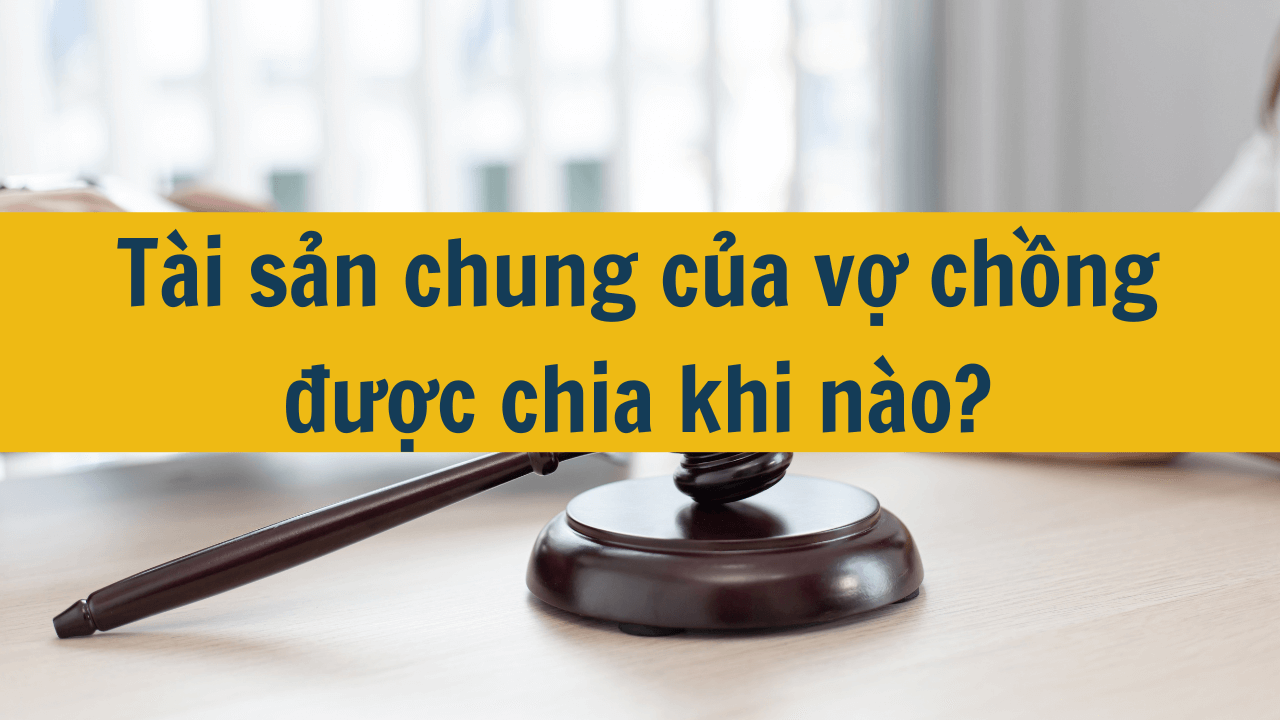
Tài sản chung của vợ chồng được chia khi nào mới nhất 2025?
Tài sản chung của vợ chồng được chia khi nào? Đây là câu hỏi phổ biến trong các vụ việc ly hôn hoặc tranh chấp tài sản. Việc xác định thời điểm và cách thức chia tài sản chung không chỉ dựa trên thỏa thuận giữa các bên mà còn phải tuân thủ quy định pháp luật. Trong bài viết này, chúng ta sẽ cùng tìm hiểu những trường hợp cụ thể khi tài sản chung của vợ chồng được chia và nguyên tắc pháp lý áp dụng. 31/12/2024Căn cứ xác lập tài sản chung của vợ chồng mới nhất 2025
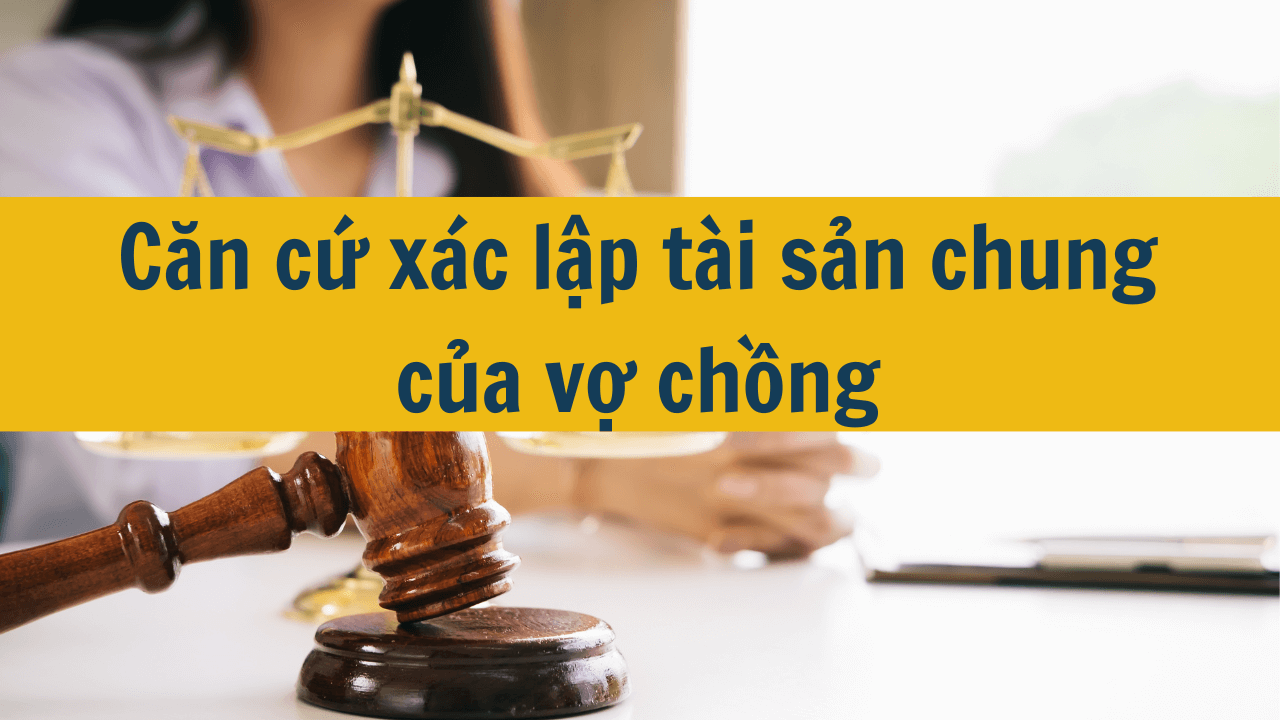
Căn cứ xác lập tài sản chung của vợ chồng mới nhất 2025
Tài sản chung của vợ chồng là vấn đề pháp lý quan trọng, ảnh hưởng trực tiếp đến quyền lợi và nghĩa vụ của cả hai bên trong hôn nhân. Vậy pháp luật quy định như thế nào về căn cứ xác lập tài sản chung? Bài viết này sẽ cung cấp thông tin chi tiết, rõ ràng và chuẩn pháp lý, giúp bạn hiểu rõ hơn về quyền sở hữu tài sản trong hôn nhân. 31/12/2024Trên Sổ đỏ có ghi tài sản chung, riêng vợ chồng không mới nhất 2025?
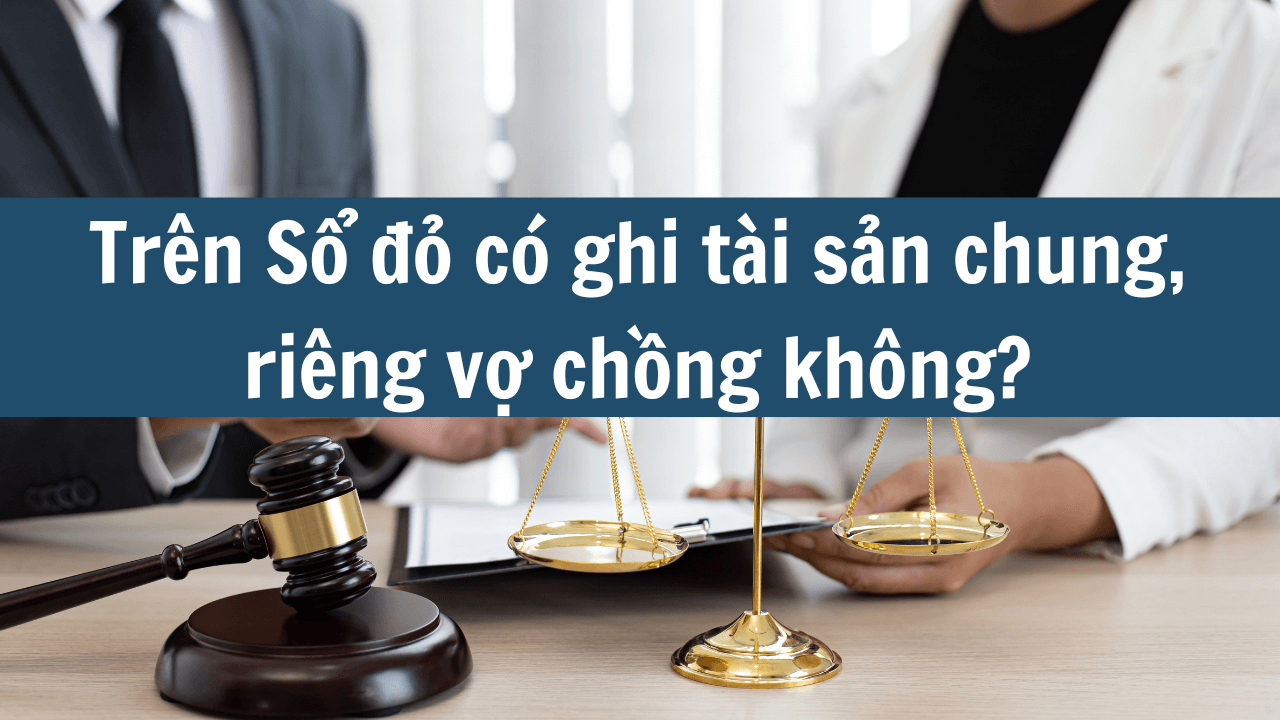
Trên Sổ đỏ có ghi tài sản chung, riêng vợ chồng không mới nhất 2025?
Sổ đỏ là giấy tờ pháp lý quan trọng xác định quyền sử dụng đất và quyền sở hữu tài sản gắn liền với đất. Tuy nhiên, nhiều người vẫn thắc mắc liệu trên Sổ đỏ có thể ghi rõ tài sản chung hay riêng của vợ chồng hay không. Bài viết này sẽ giải đáp chi tiết quy định pháp luật hiện hành về vấn đề này, giúp bạn hiểu rõ quyền lợi và trách nhiệm của mình. 31/12/2024Việc chiếm hữu, sử dụng, định đoạt tài chung của vợ chồng được quy định như thế nào mới nhất 2025?
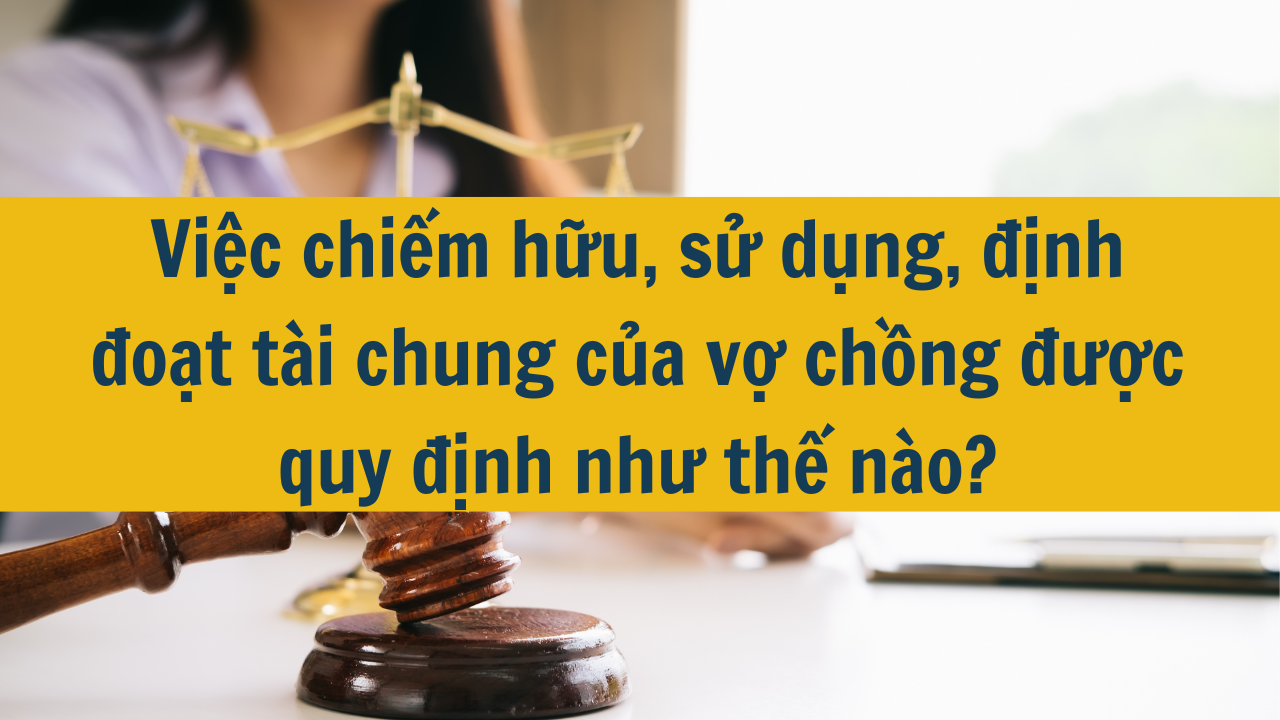
Việc chiếm hữu, sử dụng, định đoạt tài chung của vợ chồng được quy định như thế nào mới nhất 2025?
Tài sản chung của vợ chồng luôn là vấn đề pháp lý quan trọng trong hôn nhân và gia đình. Việc chiếm hữu, sử dụng, định đoạt tài sản chung không chỉ ảnh hưởng đến quyền lợi của mỗi bên mà còn đảm bảo tính minh bạch và công bằng trong mối quan hệ hôn nhân. Bài viết này sẽ phân tích chi tiết các quy định pháp luật về vấn đề này theo Luật Hôn nhân và Gia đình hiện hành. 31/12/2024Việc đăng ký quyền sở hữu, quyền sử dụng đối với tài sản chung của vợ chồng được quy định như thế nào mới nhất 2025?
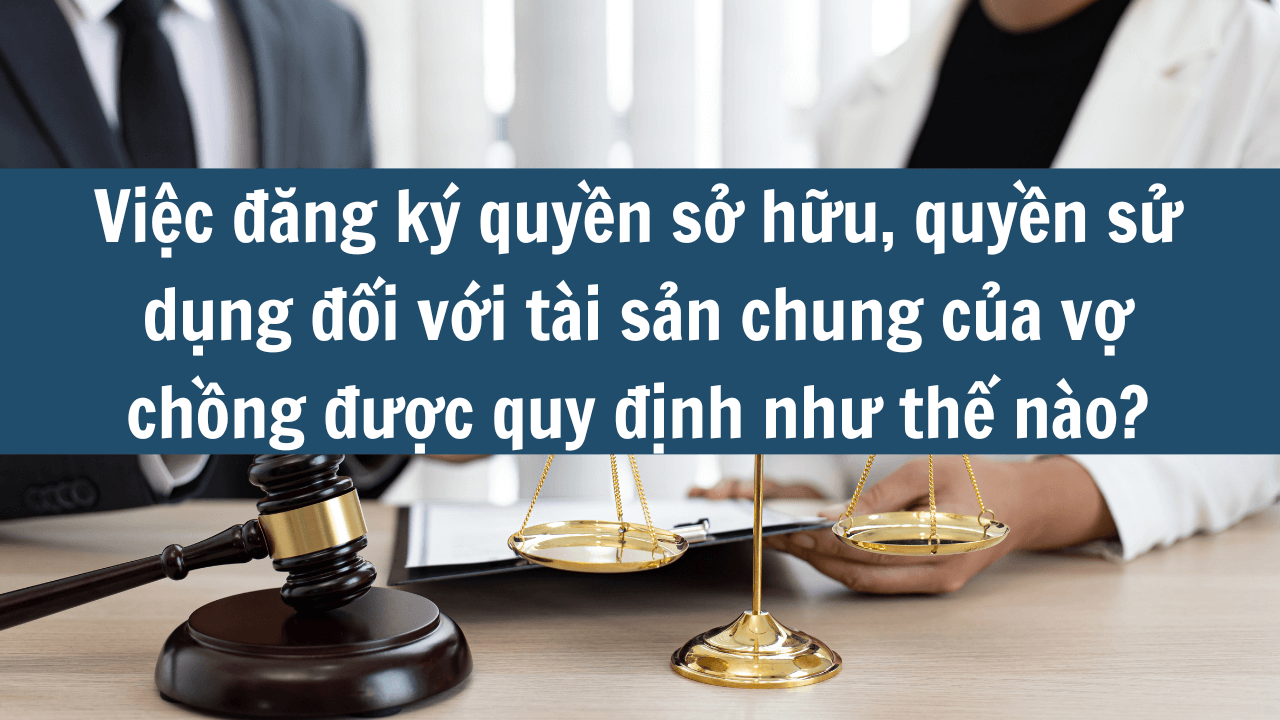
Việc đăng ký quyền sở hữu, quyền sử dụng đối với tài sản chung của vợ chồng được quy định như thế nào mới nhất 2025?
Việc đăng ký quyền sở hữu, quyền sử dụng đối với tài sản chung của vợ chồng là vấn đề pháp lý quan trọng, đảm bảo quyền lợi hợp pháp cho cả hai bên trong hôn nhân. Theo quy định pháp luật Việt Nam, quá trình này không chỉ bảo vệ quyền tài sản mà còn giảm thiểu tranh chấp về sau. Bài viết này sẽ phân tích chi tiết các quy định pháp luật hiện hành liên quan đến vấn đề này 31/12/2024Chế độ tài sản của vợ chồng phải tuân theo nguyên tắc nào mới nhất 2025?
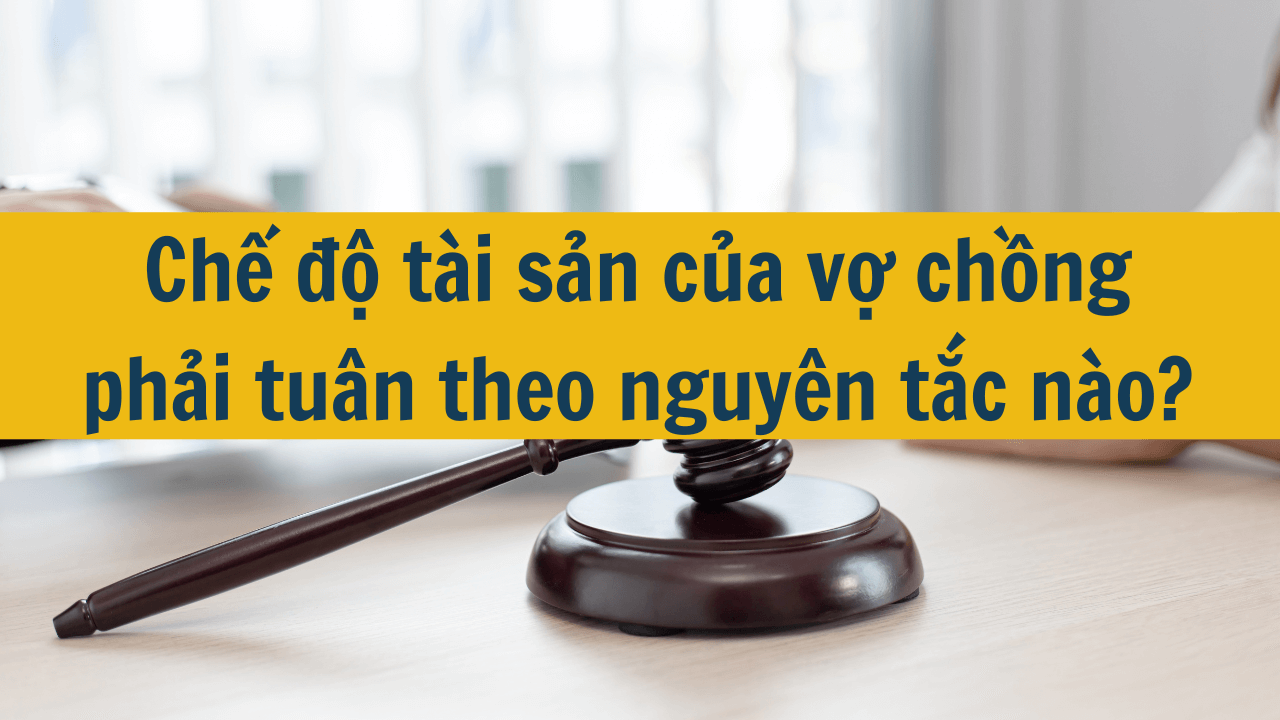
Chế độ tài sản của vợ chồng phải tuân theo nguyên tắc nào mới nhất 2025?
Chế độ tài sản của vợ chồng là nền tảng quan trọng để đảm bảo quyền và nghĩa vụ của mỗi bên trong hôn nhân. Vậy, những nguyên tắc pháp lý nào chi phối chế độ tài sản này? Bài viết sẽ làm rõ các quy định pháp luật hiện hành, giúp bạn hiểu rõ quyền lợi và trách nhiệm của mình trong quan hệ hôn nhân. 31/12/2024Những khoản nợ nào được chi trả bằng tài sản chung của vợ chồng mới nhất 2025?
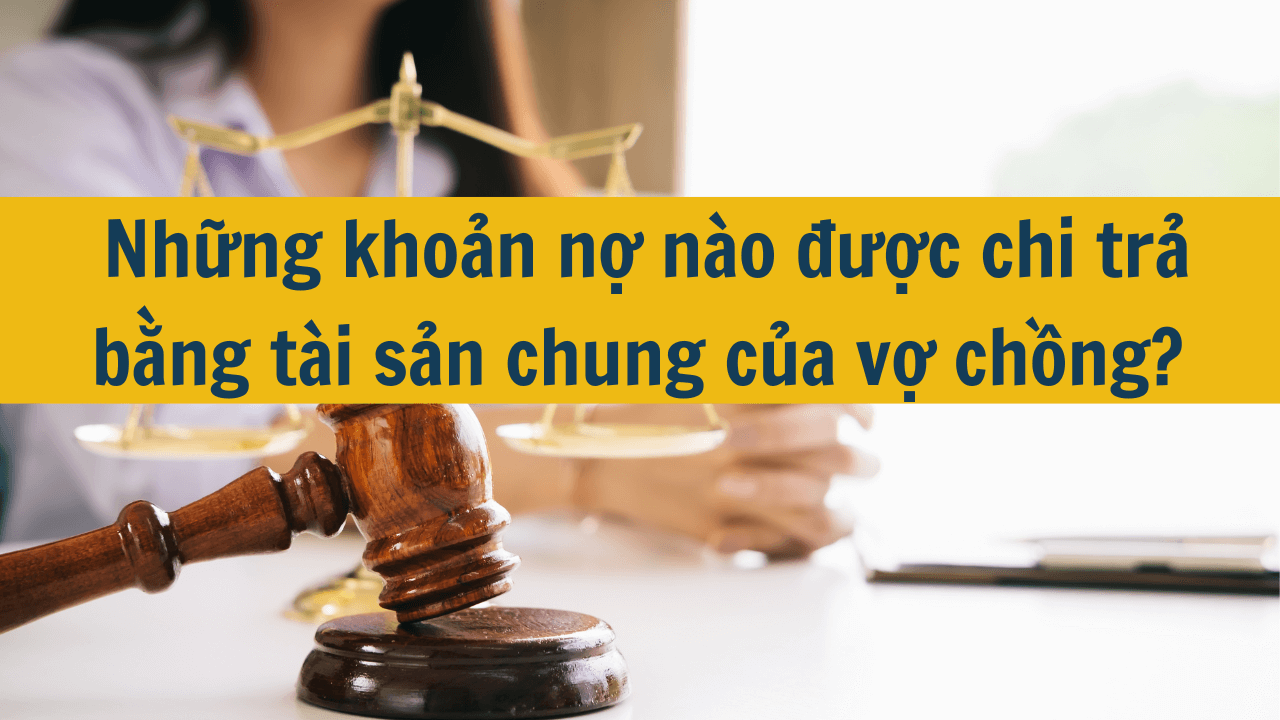
Những khoản nợ nào được chi trả bằng tài sản chung của vợ chồng mới nhất 2025?
Trong cuộc sống hôn nhân, vấn đề nợ chung và tài sản chung của vợ chồng luôn là chủ đề được quan tâm đặc biệt. Vậy, những khoản nợ nào sẽ được chi trả bằng tài sản chung? Cùng tìm hiểu rõ hơn qua bài viết dưới đây để hiểu đúng về quyền và nghĩa vụ của vợ chồng đối với các khoản nợ phát sinh trong thời kỳ hôn nhân! 31/12/2024Tài sản chung của vợ chồng bao gồm những tài sản nào mới nhất 2025?
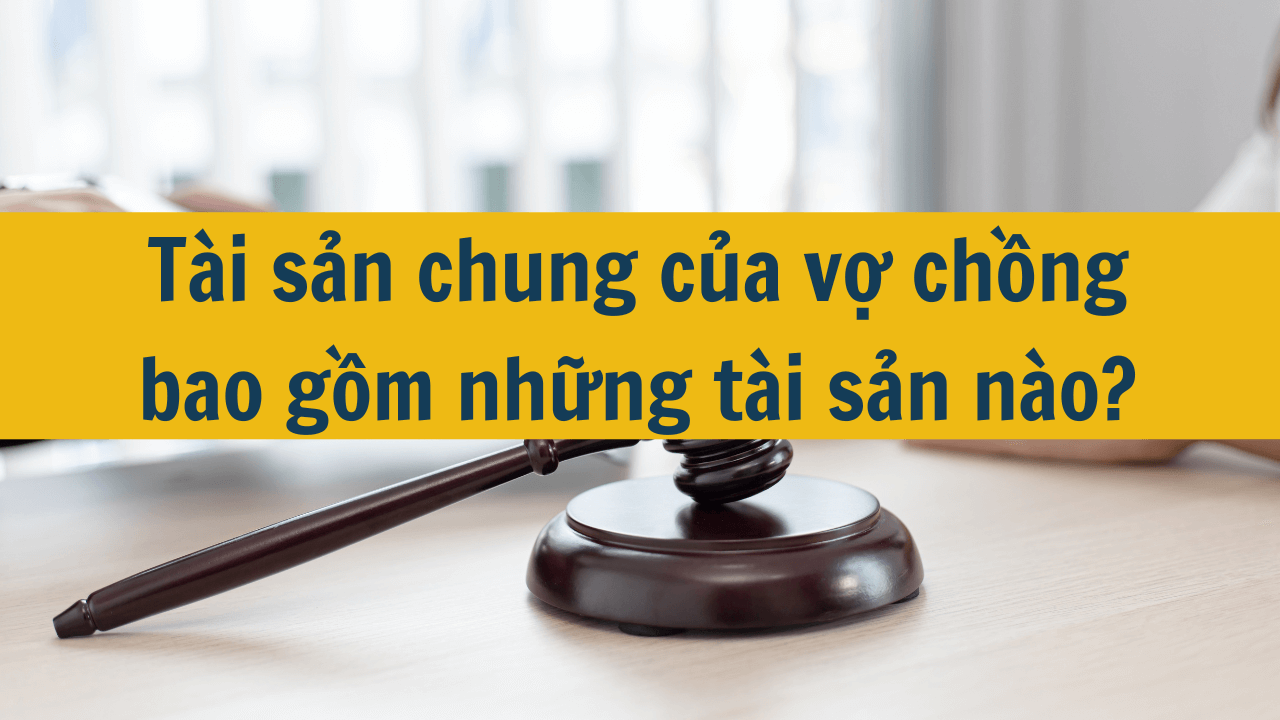
Tài sản chung của vợ chồng bao gồm những tài sản nào mới nhất 2025?
Tài sản chung của vợ chồng bao gồm những tài sản nào? Đây là câu hỏi phổ biến khi giải quyết các vấn đề pháp lý về hôn nhân và gia đình. Việc hiểu rõ tài sản nào được xem là tài sản chung giúp bảo vệ quyền lợi của cả hai bên trong quá trình chung sống hoặc khi xảy ra tranh chấp. Hãy cùng tìm hiểu chi tiết quy định pháp luật hiện hành về vấn đề này trong bài viết dưới đây! 31/12/2024Những trường hợp chia tài sản chung trong thời kỳ hôn nhân bị vô hiệu mới nhất 2025
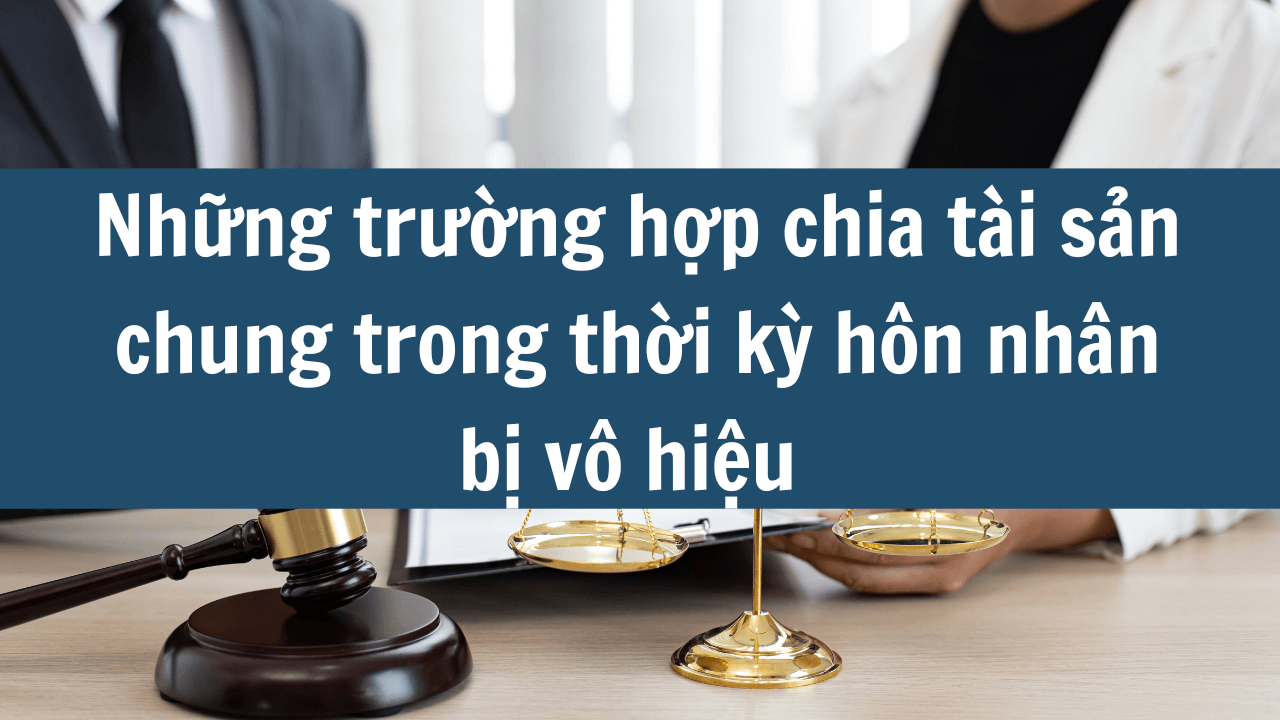
Những trường hợp chia tài sản chung trong thời kỳ hôn nhân bị vô hiệu mới nhất 2025
Việc chia tài sản chung trong thời kỳ hôn nhân là vấn đề pháp lý nhạy cảm, đòi hỏi tuân thủ chặt chẽ các quy định pháp luật. Tuy nhiên, không phải mọi thỏa thuận chia tài sản đều hợp pháp. Bài viết này sẽ giúp bạn hiểu rõ các trường hợp chia tài sản chung bị vô hiệu, từ đó tránh những rủi ro pháp lý không đáng có. 31/12/2024Tài sản chung của vợ chồng là gì? Có được chia tài sản chung của vợ chồng trong thời kì hôn nhân hay không mới nhất 2025?
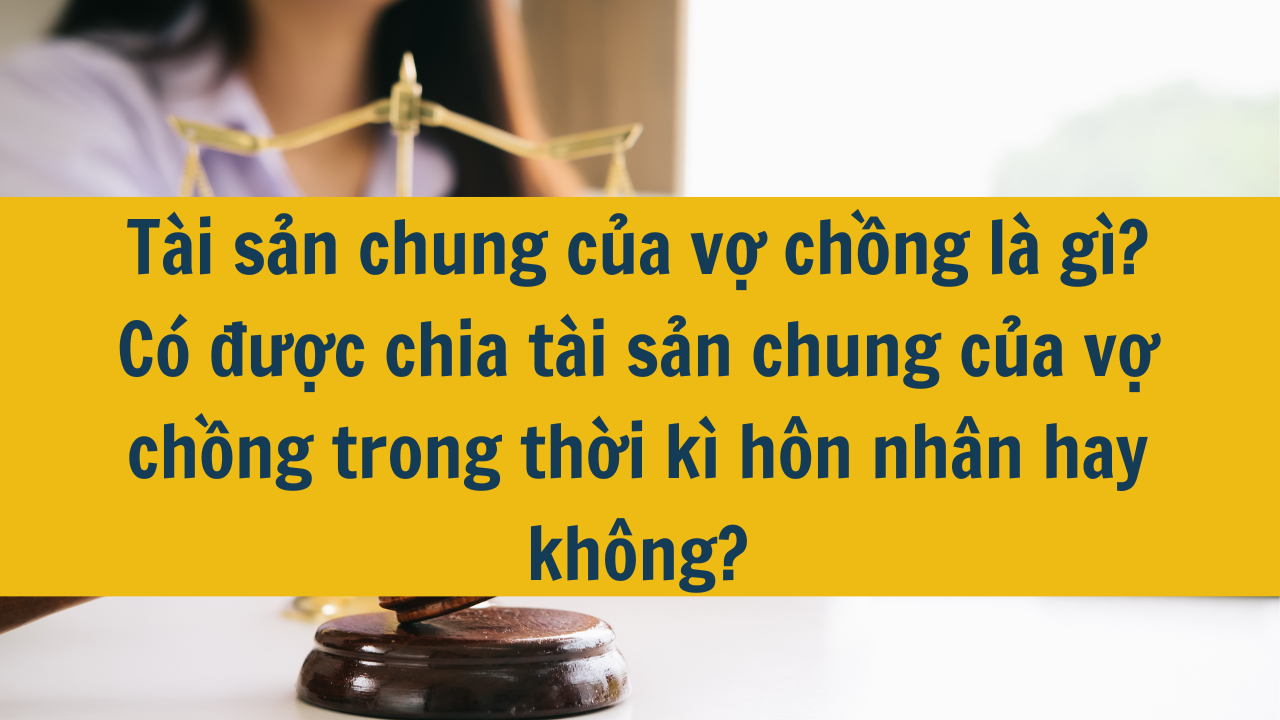

 Bộ luật Dân sự 2005 (Bản Word)
Bộ luật Dân sự 2005 (Bản Word)